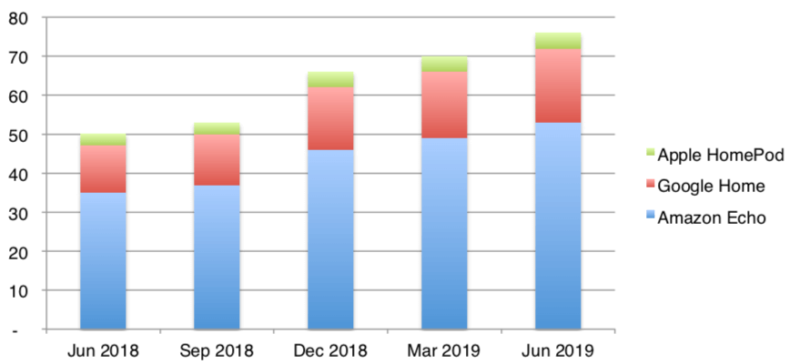HomePod M.I.A. among Apple announcements
Why isn't Apple putting more emphasis on its smart speaker?
On Tuesday, Apple held its annual hardware keynote to showcase the company’s new device offerings – especially the iPhone. Among the several announcements were indeed new iPhones, along with new Apple watches, an aggressively priced new iPad along with with subscription services Apple Arcade and Netflix rival Apple TV+.
Smart speaker missing. Glaringly absent was a refreshed HomePod or smart display or lower-priced smart speaker. And, unless I completely missed it, there was nary a mention of Siri other than a brief cameo in the keynote’s opening video.
In marked contrast, the day before Apple’s keynote, Google pushed out its appealing (albeit awkwardly named) Google Nest Hub Max. The larger-screen device features video calling, improved sound, a Nest cam and a range of other useful features. It’s the most ambitious and functional of the growing Google Home product lineup, and it’s also reasonably priced at $229.
Meanwhile, Google and Amazon competing furiously. Google now offers a growing number of smart speakers and displays: Google Home Mini, Google Home, Google Home Max, Google Nest Hub (formerly Home Hub) and the aforementioned Nest Hub Max. These present a number of different price points, features and use cases — all equipped with Google Assistant. For its part Amazon has an even wider array of Alexa-powered devices.
Apple HomePod launched, late to the market, in 2017. However, it missed the holiday shopping season and didn’t ship until February 2018. It initially retailed for $349 but Apple lowered the price in April this year in the face of soft demand and more aggressively priced rivals.
U.S. smart speaker market share (August, 2019)

According to August consumer survey data from Consumer Intelligence Research Partners, Amazon maintains a 70% share of the smart speaker/display market in the U.S., while Google had 25% and Apple HomePod had 5%. In 2018, the figures were almost the same, with HomePod at 6% and Google Home at 24%.
Why we should care. While the smart speaker/voice assistant market hasn’t yet lived up to its potential as an advertising or commerce platform, it’s an important technology category with huge adoption. In addition, ownership has been shown to drive other smart home purchases. Thus, smart speaker penetration is translating into smart home ecosystem leadership.
Apple’s business model is still based substantially on hardware sales. This is a market the company should own. Indeed, Apple should have been first out of the gate with a smart display. Yet the company has been strikingly passive and almost indifferent, it would appear.
Contributing authors are invited to create content for MarTech and are chosen for their expertise and contribution to the search community. Our contributors work under the oversight of the editorial staff and contributions are checked for quality and relevance to our readers. MarTech is owned by Semrush. Contributor was not asked to make any direct or indirect mentions of Semrush. The opinions they express are their own.
Related stories
New on MarTech